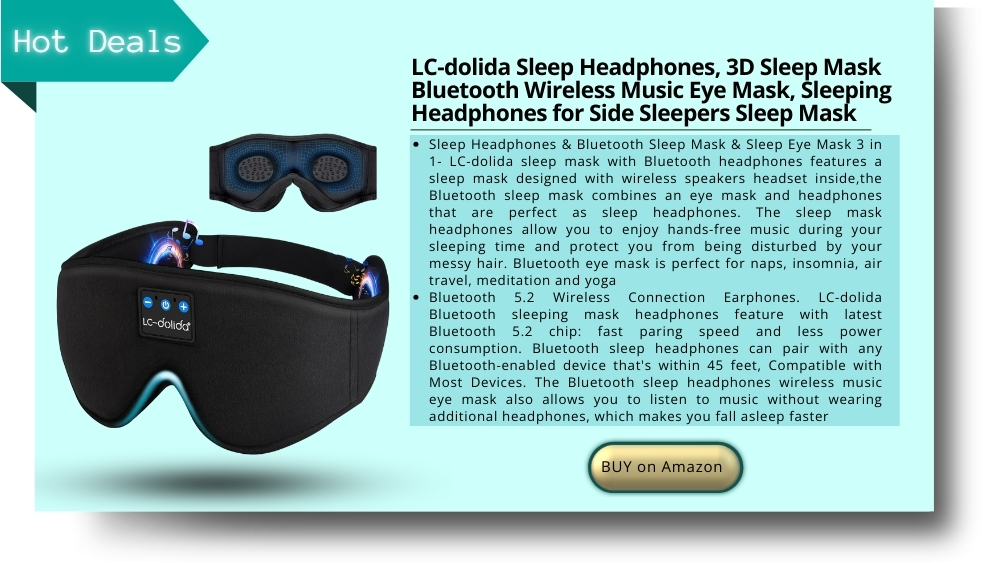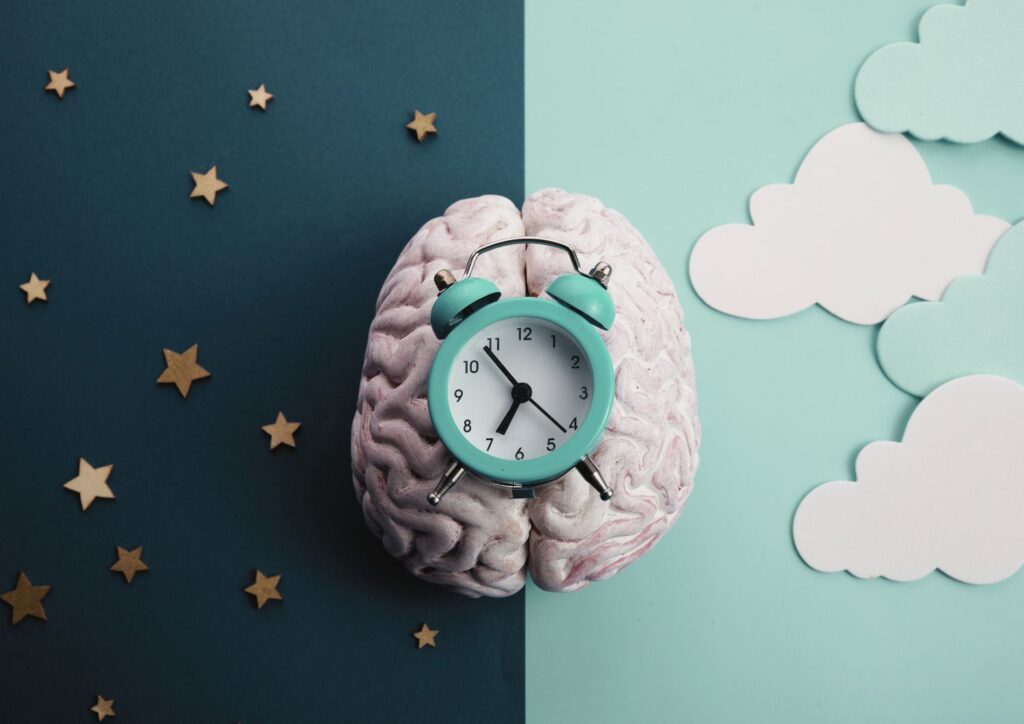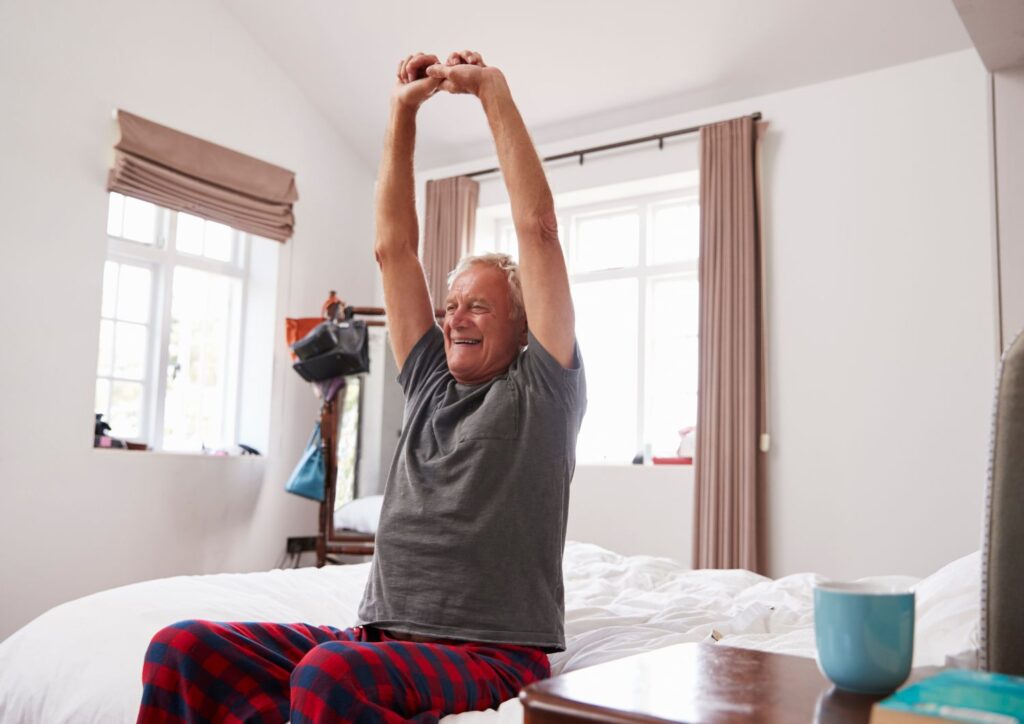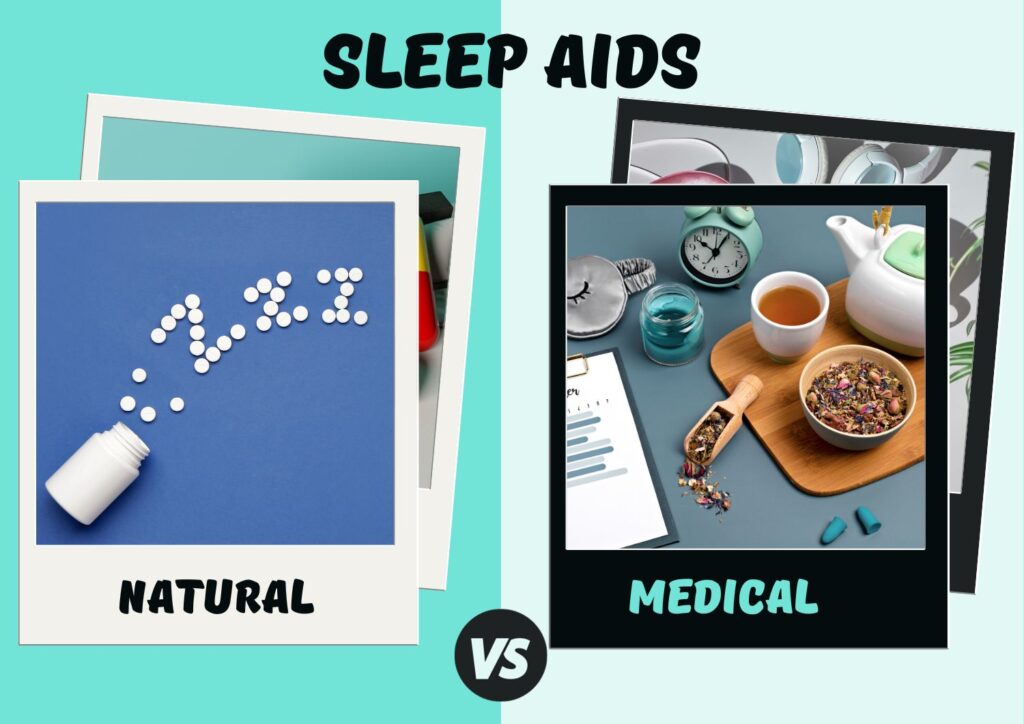Are you having trouble achieving the peaceful, uninterrupted sleep you once enjoyed? You’re not alone! As we get older, our sleep quality may change, causing restlessness at night for many older adults.
Fear not, as this guide will uncover the secrets to help you reclaim restful nights of sleep. Achieving quality sleep goes beyond traditional methods like counting sheep or relying on trendy gadgets.
Let’s delve into the distinctive sleep issues that accompany aging and discover solutions tailored for seniors. Consider this your ultimate guide for addressing senior sleep challenges.
So, are you ready to start on this journey towards better sleep? Let’s dive right in and discover the keys to your restful nights.

Contents
The Need for Senior Sleep Solutions
Senior sleep solutions are not just a fancy phrase. Picture this: after a full day with your grandkids, relishing their laughter, stories, and boundless energy. At night, you anticipate a peaceful rest. However, you end up gazing at the ceiling, tallying sheep, or reminiscing about the past when sleep was effortless.
As we age, achieving a full night’s rest can become challenging. It is essential for maintaining optimal mental and physical health. Aging brains and bodies can experience disruptions in their normal sleep cycles.
Prefer to listen rather than read?
With external distractions like street noise or a bothersome streetlight, it’s understandable why you’re seeking solutions. Don’t worry, we’re delving into the realm of senior sleep remedies to assist everyone in getting the rest they need!

The Science of Sleep in the Senior Years
Exploring the realm of sleep as we age can be fascinating. It’s typical to observe changes in our sleep patterns with older age. You may be experiencing more frequent awakenings during the night or difficulty falling asleep. The quality of our sleep is just as important as the quantity.
Unlocking the Secrets of Senior Sleep: How Aging Affects Sleeping Patterns
Do you ever wonder why you always seem to be nodding off before the 8 o’clock news or why you’re up at the crack of dawn, bright-eyed and bushy-tailed? Well, it turns out, there’s more to it than just their bedtime preferences. It’s all about the fascinating world of our internal clocks, or, as scientists call it, our “circadian rhythm.”
Let’s dive into teh age-old mystery of why aging affects our sleep patterns, and how it can sometimes feel like a nightly tug-of-war between getting too much shut-eye too soon and missing out on precious morning hours.

So what’s this circadian rhythm thing all about, and why does it get wonky as we get older? Well, think of it as your body’s built-in sleep schedule. When you were a little kid, you probably had no trouble staying up late to watch your favourite cartoons. But as you grow up, something changes inside you.
Imagine your circadian rhythm as a trusty old watch. When you’re young, it’s like a brand-new Rolex, ticking away perfectly. But as the years go by, it starts to show some wear and tear. It’s not as precise as it used to be. That’s what happens to your internal clock as you age.
As you age, your circadian rhythm can throw your sleep schedule for a loop. Your body might start feeling super tired way earlier in the evening. That’s why your eyes start closing during the evening news. On the flip side, you might find yourself waking up at the crack of dawn and wondering what to do with all those extra morning hours.
Understanding Common Sleep Issues in Seniors
Many seniors struggle to sleep peacefully at night due to sleep disorders such as sleep apnea, restless leg syndrome, and insomnia.
However, by understanding and addressing these issues, you can take the first step towards senior sleep solutions. Thus, let’s delve into and enlighten these disturbances that occur during the night.
Sleep Apnea: A Hidden Threat
The first sleep disorder we encounter on our quest for senior sleep solutions is sleep apnea. This condition is more common than you might think and can silently wreak havoc on your night’s rest.
With sleep apnea, individuals experience recurrent pauses in their breathing while asleep, sometimes lasting for several seconds. This relentless interruption of oxygen flow can lead to fragmented sleep, leaving you feeling exhausted and irritable during the day.
Recognizing sleep apnea is crucial for seniors, as it has been linked to various health concerns, including hypertension, heart disease, and diabetes. If you or a loved one experiences loud snoring, choking, or gasping for air during sleep, it’s time to pay attention and seek professional guidance.
Restless Leg Syndrome: The Annoying Itch
Moving on to our second sleep disruptor, restless leg syndrome (RLS) is like an itch you just can’t scratch. Seniors with RLS often describe an irresistible urge to move their legs, particularly when they’re at rest, like when lying in bed. This constant restlessness can make falling asleep a Herculean task.
Insomnia: The Nighttime Nemesis
Last but certainly not least, insomnia is a nemesis that can haunt seniors when the lights go out. Insomnia isn’t just about tossing and turning in bed; it’s a persistent difficulty falling asleep or staying asleep. It’s as if the Sandman has forgotten your address.
Insomnia can be triggered by various factors, such as stress, medication side effects, or even underlying health conditions.

So, remember, the first step toward achieving senior sleep solutions is recognizing these common sleep disorders in seniors. By doing so, you’re not just reclaiming your nights; you’re ensuring a brighter and more energized tomorrow.
Don’t let sleep troubles define your senior years; take charge of your sleep, and let’s embark on this journey together.
Why Sleep is Important for Seniors
Sleep is a universal necessity, an essential pillar of good health that transcends age. However, for seniors, the value of quality sleep takes on even greater significance. Here are some reasons why sleep is important to seniors:
Cognitive Health and Memory
As we age, cognitive health becomes increasingly precious. Quality sleep is like a mental spa for the brain. During sleep, the brain engages in processes that consolidate memories, enhance learning, and clear away the mental clutter of the day.
For seniors, this means that a good night’s sleep can help keep the mind sharp, potentially reducing the risk of cognitive decline and memory problems.
Physical Health and Healing
Sleep is a time when the body works diligently to repair and rejuvenate itself. This is particularly vital for seniors, as it can aid in the healing of injuries and the recovery from illnesses. Adequate sleep contributes to a stronger immune system, helping seniors fight off infections and illnesses more effectively.
Emotional Well-being
Emotional well-being is another area where sleep plays a significant role. Seniors who struggle with sleep are more likely to experience mood swings, increased stress, and even depression. Quality sleep provides emotional stability, helping seniors better navigate the challenges that life may bring in their later years.
Pain Management
Seniors often grapple with chronic pain conditions, such as arthritis or back pain. Sleep plays a role in pain perception and management. Poor sleep can amplify pain, making it feel more intense and debilitating. Conversely, getting enough restorative sleep can help reduce the perception of pain, improving overall comfort and quality of life.
Cardiovascular Health
Heart health is a paramount concern for seniors, and sleep is intimately connected to it. Chronic sleep deprivation has been linked to an increased risk of heart disease, high blood pressure, and stroke. Prioritizing sleep can be a proactive step toward maintaining a healthy heart in the senior years.
Balance and Fall Prevention
Balance and coordination are critical for seniors to maintain their independence. Sleep plays a role in enhancing these aspects by allowing the body to recharge and refresh. Seniors who consistently get good sleep are better equipped to prevent falls and accidents.

Quality of Life
Ultimately, sleep profoundly affects a senior’s overall quality of life. It is the foundation upon which the physical, mental, and emotional aspects of well-being rest. Seniors who prioritize their sleep often report a greater sense of vitality, engagement, and joy in their daily lives.
Sleep is not merely a luxury but a fundamental need for everyone, regardless of age. However, for seniors, it takes on a heightened importance due to its far-reaching impact on cognitive health, physical well-being, emotional stability, and overall quality of life.
Recognizing and addressing sleep-related issues is a proactive step toward ensuring that seniors can fully enjoy their golden years with the vitality and vigour they deserve.
Practical Sleep Solutions for Seniors
Everyone, especially our wise seniors, needs a special corner to break away from life’s hustle, curl up, and smoothly sail into dreamland. Wondering how to make that magic happen? Let’s journey through some top-notch senior sleep solutions!
Bed Basics
Kick things off right here! A good mattress is one of the most important senior sleep solutions, especially one that’s kind to aging muscles and joints. Pair that with gentle sheets that let the skin breathe and a snug blanket.
Oh, and don’t forget a pillow that matches how you sleep – whether you’re a side sleeper, back enthusiast, or stomach snoozer, it can be a game-changer!
Cool & Cozy
Did you know there’s an ideal temperature that makes sleep a breeze? Aim for a room feel around 65°F (18°C). A tad cooler than you thought, right? And if Mother Nature isn’t playing nice, consider fans or heaters as senior sleep solutions.
Light Matters
As the day waves goodbye, turning down the lights gives our brain a nudge – “Hey, it’s snooze time!”. And those blackout curtains? Worth their weight in gold, ensuring that darkness cradles you into a deep sleep.
Embrace the Quiet
Noise, the notorious sleep bandit! If those outdoorsy sounds don’t shush, think white noise gadgets or perhaps some handy earplugs. They’re ace at blocking out noisy neighbours or even those chirpy night birds.

Tech Timeout
Tempted to take one last peek at your device? Resist! That sneaky blue light from screens loves to play tricks on our sleep routine. How about unwinding with a page-turner instead?
A Scent of Tranquility
Ever tried a hint of lavender on your pillow? Or a calming room mist? They’re not exclusive to spa day; they’re senior sleep solutions that bring serenity right to your bedside.
Neat and Tidy
A neat space often leads to a peaceful mind. Give yourself a few moments daily to tidy up. It’s surprising how much a clutter-free zone can boost sleep quality.
Safety Above All
For our seniors, room safety is paramount. Keep it hazard-free, ensure light switches are accessible, and maybe pop a phone nearby, just in case.
Every individual’s ideal sleep haven might have its quirks. So, feel free to mix, match, and tweak these senior sleep solutions to find the best fit. Here’s to dream-filled nights!
Sleep Aids: Natural vs. Medical
If you’ve been scratching your head about how to achieve those golden hours of slumber, then you might want to check these out. Navigating the world of senior sleep solutions can seem a bit like trying to solve a puzzle.

With so many options out there, how do you figure out what’s best? Let’s embark on this quest to uncover the pros and cons of both natural and medical sleep aids, specially tailored as senior sleep solutions.
Now, when it comes to senior sleep solutions, there’s no one-size-fits-all answer. Some folks swear by the calming powers of chamomile tea, while others may rely on doctor-prescribed sleep aids. The big question is, what’s the difference, and more importantly, what will work for you?
Natural Sleep Aids
Have you ever paused to appreciate the wonders of Mother Nature? She’s got a remedy for almost everything, including those sleepless nights that sometimes give us a nudge. Especially when it comes to senior sleep solutions, nature might just have the gentle touch you’ve been searching for.
Herbal teas, like chamomile and valerian root, have been sipped for ages to beckon sleep. Then there’s melatonin, a supplement that mirrors a hormone our bodies naturally produce, guiding us into dreamland.
These natural options have the charm of usually being kinder with fewer side effects, making them a fantastic starting point for anyone dipping their toes into the realm of senior sleep solutions.
So, if you’re contemplating a natural route, it’s heartwarming to know that Mother Nature has got your back, offering senior sleep solutions that feel both comforting and safe. Let’s journey into restful nights the natural way!
Medical Sleep Aids
On the other side of the spectrum, we have sleep aids that pack a stronger punch. Navigating the realm of sleep aids can be like traversing a vast sea – there’s a lot out there. But among all the options, medical sleep aids stand out, especially when we talk about senior sleep solutions.
These aren’t your everyday over-the-counter remedies. Medical sleep aids are like the heavy-hitters of the sleep world. Think of them as the strong, silent types that come in when natural methods might not cut it.
Usually prescribed by doctors, they’ve been designed with precision and purpose. Each one comes with its playbook – or rather, instructions – ensuring they’re used correctly.
However, with great power comes great responsibility. While these aids can be super efficient, it’s crucial to remember that they’re not one-size-fits-all. For our senior folks, it’s especially important to use them under a watchful eye.
Consulting with healthcare professionals and following their guidance can make a world of difference when considering these as senior sleep solutions.

So, if you’re on the journey to find the right senior sleep solutions for yourself or a loved one, medical sleep aids might just be the compass you need. They can be efficient, but it’s essential to use them under a healthcare professional’s guidance, especially when considering them as senior sleep solutions.
As we delve deeper, keep in mind that everyone’s journey to sleep is unique. What works wonders for one might be different for another. It’s all about striking a balance and finding the right senior sleep solutions that cater to individual needs.

Conclusion
Navigating the challenges seniors often face at bedtime might seem tough, but with the right strategies, it’s entirely doable. By recognizing these challenges and putting the right senior sleep solutions into action, like setting a routine or adjusting the bedroom ambience, we pave the way for improved sleep.
Of course, never underestimate the value of professional advice. Sometimes, a chat with a healthcare expert can provide the insights needed to fine-tune those senior sleep solutions.
In the end, by embracing these senior sleep solutions, you’re not only promising yourself better nights but also brighter days. Sleep well and thrive!



